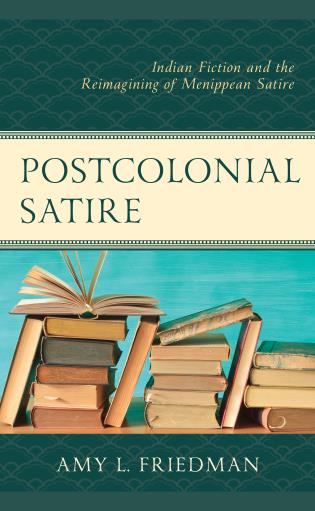First, there is the book, finished in 2019 and available *NOW* in hardback or as an e-book.
Postcolonial Satire: Indian Fiction and the Reimagining of Menippean Satire

Your library needs a copy!
Reviews
In this scrupulously researched study, Amy L. Friedman clears fertile theoretical ground on which to interpret some of India’s most capacious and impudent novels. Fictions often labelled magic realism or postmodern fabulation are convincingly re-visioned here as Menippean satire, and an elusive, ancient genre gains an exponent finely attuned to its powerful sway on the postcolonial literary imagination. — John C. Ball, University of New Brunswick
This book breaks new ground by revealing something that has been sensed in postcolonial studies for some time but never deeply explored. The role of Menippean satire in contesting imperial power is shown here to lie in its vigorous and irreverent boundary challenging and this exuberance finds it most powerful expression in the South Asian novels of Desani, Rushdie, Sealy and others. The Menippean character of this satiric confrontation is shown to be the key to its power and suggests why the Indian novel is so important to postcolonial literary study. — Bill Ashcroft, Emeritus Professor, School of English, Media and Performing Arts, University of New South Wales
Dr. Friedman brings a sharp eye, a good ear for languages, and incisive intelligence to the task of unravelling deliberately challenging fictions by four postcolonial Indian writers. She gives particular explanatory emphasis to their skillful deployment of age-old strategies of Menippean satire — literary echoes and glancing allusions to earlier culture, ironical subversions, unexpected sidetracks or authorial interventions — to jar their readers into critical awareness. Handling these unwieldy materials with confident energy, Dr. Friedman appreciates the carnivalesque qualities of improbable characters and wandering stories even as she demonstrates the ethical seriousness of the underlying satire. In the end she conveys persuasively the double aspect of postcolonial satiric creativity: sophisticated writers look over their shoulders at influential cultural antecedents all the while they reach forward to establish artistic and political independence. — Peter Briggs, Professor Emeritus of English, Bryn Mawr College
Synopsis: Postcolonial Satire: Indian Fiction and the Reimagining of Menippean Satire positions postcolonial South Asian satiric fiction at the intersection of the cutting-edge territory of political resistance writing and the ancient tradition of Menippean satire. Postcolonial Satire disrupts the relationship between postcolonial literature and magic realism, by discussing the work of writers such as G. V. Desani, Aubrey Menen, Salman Rushdie, and Irwin Allan Sealy as one movement into the entirely subversive realm of satire. Indian fiction, as well as the fiction of other colonized cultures, can be re-construed through the lens of satire as openly critical of a broad spectrum of political and cultural issues. Employing the strengths of postcolonial theory and criticism, Postcolonial Satire expands upon the postcolonial works of these authors by analyzing them as satire, rather than magical realism with satirical elements.
